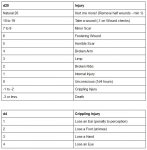You know that DM that likes their game to be one which hero death matters? Who feels like the game should seem deadly on the perspective of the adventures so to keep them on their toes? Who takes from their hat add-ons to resurrection and raise dead spells that effectively make them once-in-a-campaign events that require quests that could even take more lives than save, so to restrict any magical resurrection to people that are really, really, (really?) praised and cherished, so as to someone be willing to save their own life to try to save that other person? Who does not shy away from employing save-or-die (or better, choose-wisely-or-die) scenarios, as long as they are well telegraphed to the players so to avoid gotchas. Well, I am one of those damn DMs.
Something that has been happening for a while (it is not a 5e specific issue), and that bothers me is the recklessness displayed by some players regarding other adventurers in the party. I have players that simply refuse, at any cost, to spend one turn or a higher level resource to rescue a comrade in bad conditions during a melee. I find it more annoying that by entitling themselves to be complete arses, they even manage to complicate some encounters, by not preemptively acting to protect one another, followed by a dropped ally, who subsequently loses their action and is one less threat for the enemies.
This usually seems to happen for two (or three) reasons that I could observe:
- Using an action now to prevent an ally from dropping is perceived as a weaker strategy as acting before the fact to prevent the drop and the ally's losing an action.
- Healing a fallen ally is cheaper, as any leftover damage does not get accounted for.
- When the fight is too close to the end, it seem better just to try for a finishing blow and them rescue any fallen comrades.
While I generally agree with the third bullet myself (even though I find it somewhat reckless in some circumstances), the first bullet really annoys me. It has over and again being detrimental to the party tactics, but selfishness usually takes over and they never learn the lesson, even when adventurers start dying as a result of a battle becoming tougher.
The second bullet is a result of the specific way health is abstracted in 5e (as in previous editions, and with the house-rules my table used, all lost HPs had to be accounted), and I find it even more annoying, as it effectively introduces the "bouncing heroes" effect.
To address these issues (mostly the first and second bullets), I could go full "evil" and just start using actions from the baddies to terminate fallen heroes as soon as these baddies notice the healing capabilities of the party. But, on the other hand, sometimes I feel like I am even more of an arse than my usual self by doing this. This "solution" has, though a subjective advantage of not needing any rules tweak.
Then I thought about a second option. What if every time someone gets dropped, they will take at least some minutes to be able to recover consciousness? If someone hits 0 HPs during combat, they can be stabilized, or even healed by cure wounds or whatever, but they do not simply come back to fight as if nothing had happened, after having their HPs restored to values bigger than zero.
I feel like this option would add some interesting twists to the game dynamics, the party should start to feel more pressed to hold everybody up, as if someone drops, that ally will be out of action until that combat ends. It also enables some nice action scenes, with someone stabilized being carried by their allies in a retreat. Also, allowing an ally that dropped to be defenseless in the middle of the brawl might look very dangerous, as that ally will not be easily recoverable. I know it could potentially let Jimmy very bored as his selfless chevalier PC got down in the beginning of the combat trying to protect that frail spellcaster ally, but I think most of the time the party would go to extra pains to avoid this from happening as it would be very detrimental for the whole group.
But, you know, I can be overlooking some obvious detrimental consequences, so I am looking forward for some input from the community. What do you think? Do anybody have another option that could address these points? Thanks for all contributions in advance!





